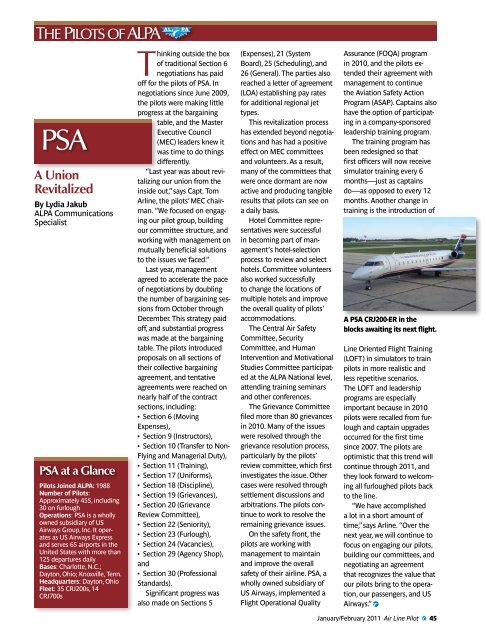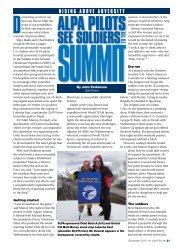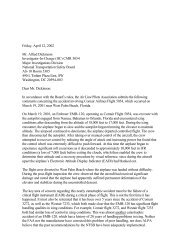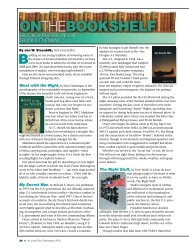The Pilots of ALPA - Air Line Pilots Association
The Pilots of ALPA - Air Line Pilots Association
The Pilots of ALPA - Air Line Pilots Association
You also want an ePaper? Increase the reach of your titles
YUMPU automatically turns print PDFs into web optimized ePapers that Google loves.
THE PILOTS OF <strong>ALPA</strong><br />
PSA<br />
A Union<br />
Revitalized<br />
By Lydia Jakub<br />
<strong>ALPA</strong> Communications<br />
Specialist<br />
PSA at a Glance<br />
<strong>Pilots</strong> Joined <strong>ALPA</strong>: 1988<br />
Number <strong>of</strong> <strong>Pilots</strong>:<br />
Approximately 455, including<br />
30 on furlough<br />
Operations: PSA is a wholly<br />
owned subsidiary <strong>of</strong> US<br />
<strong>Air</strong>ways Group, Inc. It operates<br />
as US <strong>Air</strong>ways Express<br />
and serves 65 airports in the<br />
United States with more than<br />
125 departures daily<br />
Bases: Charlotte, N.C.;<br />
Dayton, Ohio; Knoxville, Tenn.<br />
Headquarters: Dayton, Ohio<br />
Fleet: 35 CRJ200s, 14<br />
CRJ700s<br />
Thinking outside the box<br />
<strong>of</strong> traditional Section 6<br />
negotiations has paid<br />
<strong>of</strong>f for the pilots <strong>of</strong> PSA. In<br />
negotiations since June 2009,<br />
the pilots were making little<br />
progress at the bargaining<br />
table, and the Master<br />
Executive Council<br />
(MEC) leaders knew it<br />
was time to do things<br />
differently.<br />
“Last year was about revitalizing<br />
our union from the<br />
inside out,” says Capt. Tom<br />
Arline, the pilots’ MEC chairman.<br />
“We focused on engaging<br />
our pilot group, building<br />
our committee structure, and<br />
working with management on<br />
mutually beneficial solutions<br />
to the issues we faced.”<br />
Last year, management<br />
agreed to accelerate the pace<br />
<strong>of</strong> negotiations by doubling<br />
the number <strong>of</strong> bargaining sessions<br />
from October through<br />
December. This strategy paid<br />
<strong>of</strong>f, and substantial progress<br />
was made at the bargaining<br />
table. <strong>The</strong> pilots introduced<br />
proposals on all sections <strong>of</strong><br />
their collective bargaining<br />
agreement, and tentative<br />
agreements were reached on<br />
nearly half <strong>of</strong> the contract<br />
sections, including:<br />
• Section 6 (Moving<br />
Expenses),<br />
• Section 9 (Instructors),<br />
• Section 10 (Transfer to Non-<br />
Flying and Managerial Duty),<br />
• Section 11 (Training),<br />
• Section 17 (Uniforms),<br />
• Section 18 (Discipline),<br />
• Section 19 (Grievances),<br />
• Section 20 (Grievance<br />
Review Committee),<br />
• Section 22 (Seniority),<br />
• Section 23 (Furlough),<br />
• Section 24 (Vacancies),<br />
• Section 29 (Agency Shop),<br />
and<br />
• Section 30 (Pr<strong>of</strong>essional<br />
Standards).<br />
Significant progress was<br />
also made on Sections 5<br />
(Expenses), 21 (System<br />
Board), 25 (Scheduling), and<br />
26 (General). <strong>The</strong> parties also<br />
reached a letter <strong>of</strong> agreement<br />
(LOA) establishing pay rates<br />
for additional regional jet<br />
types.<br />
This revitalization process<br />
has extended beyond negotiations<br />
and has had a positive<br />
effect on MEC committees<br />
and volunteers. As a result,<br />
many <strong>of</strong> the committees that<br />
were once dormant are now<br />
active and producing tangible<br />
results that pilots can see on<br />
a daily basis.<br />
Hotel Committee representatives<br />
were successful<br />
in becoming part <strong>of</strong> management’s<br />
hotel-selection<br />
process to review and select<br />
hotels. Committee volunteers<br />
also worked successfully<br />
to change the locations <strong>of</strong><br />
multiple hotels and improve<br />
the overall quality <strong>of</strong> pilots’<br />
accommodations.<br />
<strong>The</strong> Central <strong>Air</strong> Safety<br />
Committee, Security<br />
Committee, and Human<br />
Intervention and Motivational<br />
Studies Committee participated<br />
at the <strong>ALPA</strong> National level,<br />
attending training seminars<br />
and other conferences.<br />
<strong>The</strong> Grievance Committee<br />
filed more than 80 grievances<br />
in 2010. Many <strong>of</strong> the issues<br />
were resolved through the<br />
grievance resolution process,<br />
particularly by the pilots’<br />
review committee, which first<br />
investigates the issue. Other<br />
cases were resolved through<br />
settlement discussions and<br />
arbitrations. <strong>The</strong> pilots continue<br />
to work to resolve the<br />
remaining grievance issues.<br />
On the safety front, the<br />
pilots are working with<br />
management to maintain<br />
and improve the overall<br />
safety <strong>of</strong> their airline. PSA, a<br />
wholly owned subsidiary <strong>of</strong><br />
US <strong>Air</strong>ways, implemented a<br />
Flight Operational Quality<br />
Assurance (FOQA) program<br />
in 2010, and the pilots extended<br />
their agreement with<br />
management to continue<br />
the Aviation Safety Action<br />
Program (ASAP). Captains also<br />
have the option <strong>of</strong> participating<br />
in a company-sponsored<br />
leadership training program.<br />
<strong>The</strong> training program has<br />
been redesigned so that<br />
first <strong>of</strong>ficers will now receive<br />
simulator training every 6<br />
months—just as captains<br />
do—as opposed to every 12<br />
months. Another change in<br />
training is the introduction <strong>of</strong><br />
A PSA CRJ200-ER in the<br />
blocks awaiting its next flight.<br />
<strong>Line</strong> Oriented Flight Training<br />
(LOFT) in simulators to train<br />
pilots in more realistic and<br />
less repetitive scenarios.<br />
<strong>The</strong> LOFT and leadership<br />
programs are especially<br />
important because in 2010<br />
pilots were recalled from furlough<br />
and captain upgrades<br />
occurred for the first time<br />
since 2007. <strong>The</strong> pilots are<br />
optimistic that this trend will<br />
continue through 2011, and<br />
they look forward to welcoming<br />
all furloughed pilots back<br />
to the line.<br />
“We have accomplished<br />
a lot in a short amount <strong>of</strong><br />
time,” says Arline. “Over the<br />
next year, we will continue to<br />
focus on engaging our pilots,<br />
building our committees, and<br />
negotiating an agreement<br />
that recognizes the value that<br />
our pilots bring to the operation,<br />
our passengers, and US<br />
<strong>Air</strong>ways.”<br />
January/February 2011 <strong>Air</strong> <strong>Line</strong> Pilot 45





